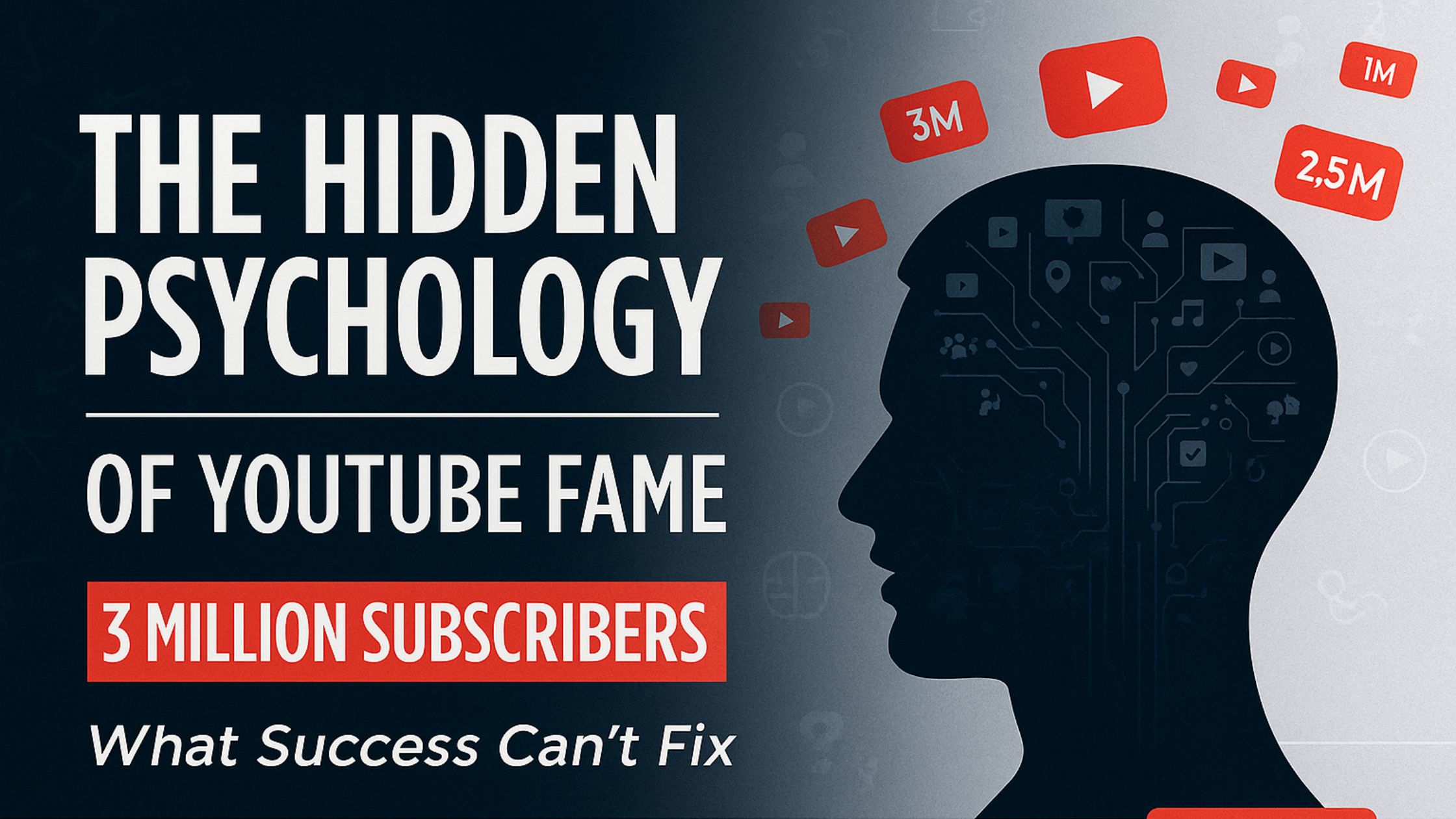The Hidden Psychology of YouTube Fame: What 3 Million Subscribers Can't Fix

The Hidden Psychology of YouTube Fame: What 3 Million Subscribers Can't Fix
Inside the mind of automotive YouTube's most vulnerable success story
In a world where automotive YouTubers compete for views with increasingly outrageous builds and clickbait thumbnails, one conversation on the Cars and Coffee Podcast revealed something far more valuable than any supercar: the unfiltered truth about what success actually costs.
Tavarish, with his 3 million subscribers and celebrity connections, dropped his carefully constructed public persona to expose the psychological reality behind YouTube fame. What emerged was a masterclass in the difference between authentic success and manufactured influence.
When Amazon Prime Comes Calling
The conversation began with revelations that would make any automotive enthusiast's jaw drop. Tavarish disclosed his participation in a multi-round audition process for the new Grand Tour, complete with chemistry tests, on-camera challenges, and a wooden go-kart building competition that had to be completed in 20 minutes.
"I must have gone over that speech probably 300 times," he admitted about his two-minute prepared presentation on the Toyota GR86's engine. "It was like asking out a girl."
Despite making it through multiple rounds alongside other prominent automotive personalities, the opportunity ultimately went to the Throttle House team. But Tavarish's reaction to the rejection revealed something crucial about his character: genuine happiness for the winners rather than bitter disappointment.
This response pattern would become a recurring theme throughout the conversation - the ability to celebrate others' success without diminishing his own achievements.
The Jay Leno Connection: When Legends Call
Perhaps nothing illustrates the surreal nature of YouTube success quite like receiving personal phone calls from Jay Leno about McLaren purchases. Tavarish shared how the comedy legend called him after buying a McLaren W1, casually mentioning that "the tax on a McLaren W1 is more than the cost of a Corvette ZR1."
These celebrity interactions happen because of YouTube, but they don't define Tavarish's daily reality. His typical day involves solitary work at his shop, talking to a camera that represents millions of viewers but feels like an audience of zero when you're actually filming.
This disconnect between public perception and private experience helps explain one of the episode's most surprising revelations.
The 3 Million Subscriber Paradox
"I have massive imposter syndrome," Tavarish confessed. "Anytime like working with Frank Stephenson or being invited here, I feel like at some point the cops are going to come and tell me I can't do this anymore."
This admission from someone who pioneered an entire genre of automotive content reveals the psychological complexity of internet fame. Despite measurable success - millions of subscribers, celebrity friendships, groundbreaking collaborations - the internal experience remains one of uncertainty and self-doubt.
His approach to managing this disconnect involves deliberate humility. He refuses to engage in name-dropping or achievement-listing, preferring to let others discover his work organically. When asked where people can find him, his response is characteristically understated: "Just look up flooded P1, you'll find me."
The UK Phenomenon: Where Audiences Actually Watch
One of the episode's most fascinating insights involved the difference between UK and US automotive audiences. Tavarish described being stopped constantly during his UK visits, particularly at Goodwood, where his friends had to wait while he interacted with fans.
His collaboration with Matt Armstrong on a Rolls-Royce Wraith build hit number one trending in the UK within hours, demonstrating the intense engagement levels of British automotive content consumers. "UK audiences die hard," he explained. "They stop everything they're doing when a video comes out from a creator that they like."
This cultural difference in content consumption explains why some automotive channels perform dramatically better in certain regions, and why understanding your audience geography matters as much as understanding their automotive interests.
Authentic Relationships in a Fake Industry
The Matt Armstrong collaboration illustrated another crucial theme: the value of genuine relationships over transactional partnerships. Tavarish described staying at Armstrong's house, using his facilities, and developing a family-like relationship that extends far beyond YouTube metrics.
"His family is my family," Tavarish shared, describing how Armstrong's father has become a regular presence at his pool during UK visits. This relationship authenticity translates directly to content quality, as viewers can sense the genuine chemistry between collaborators.
The conversation contrasted this authentic approach with the growing number of automotive YouTubers promoting questionable courses and schemes. From fake millionaire teenagers to pyramid scheme operators, the space increasingly includes creators who prioritize monetization over genuine automotive passion.
The Gaming Console Theory of Brand Loyalty
One particularly insightful moment involved Tavarish's comparison of YouTube creator loyalty to childhood gaming console wars. Just as kids defended their PlayStation or Nintendo choices with religious fervor because they couldn't afford alternatives, adult audiences often develop fierce loyalty to specific creators.
This psychological framework explains much of the drama and competition within the automotive YouTube space. Viewers become emotionally invested in their chosen creators' success, sometimes leading to conflicts that the creators themselves don't share.
Understanding this dynamic helps explain why some collaboration videos perform exceptionally well - they allow audiences to see their preferred creators interacting positively rather than competing.
The Vulnerability Advantage
Perhaps the most valuable insight from the episode was Tavarish's observation about trustworthiness indicators. "If a person is willing to be vulnerable with you early, they're probably okay," he noted. "If they're not willing to be imperfect with you, I find that to be a massive red flag."
This principle applies beyond YouTube to any relationship evaluation. People who present themselves as flawless or achievement-focused often harbor the deepest insecurities, while those comfortable discussing their struggles typically possess genuine confidence.
Tavarish's willingness to discuss his imposter syndrome, his tendency to over-apologize at restaurants, and his genuine excitement about others' success demonstrates this vulnerability in action.
The Real Success Metrics
By episode's end, a different definition of success emerged. Rather than subscriber counts or view numbers, success meant building genuine relationships, maintaining authenticity under pressure, and using platform influence responsibly.
Hector's background story - overcoming gang involvement to become a successful business owner who now seeks to help incarcerated youth - provided additional perspective on what meaningful achievement looks like. His desire to offer "one sentence" that might redirect someone's path represents success measured in human impact rather than digital metrics.
The Lasting Lesson
The conversation ultimately revealed that the most successful automotive content creators share common traits: genuine passion for cars, willingness to be vulnerable, celebration of others' success, and resistance to ego inflation despite growing influence.
For aspiring creators, the message was clear: authenticity beats production value, relationships matter more than subscriber counts, and the creators who last are those who remember why they started making content in the first place.
In an industry increasingly dominated by manufactured personalities and questionable monetization schemes, conversations like this remind us that the best automotive content still comes from people who simply love cars and aren't afraid to show their human side along the way.
Cars and Coffee Podcast continues to deliver unfiltered conversations with automotive industry personalities, exploring the human stories behind the machines and the culture surrounding them.
Keywords: Tavarish, automotive YouTube, imposter syndrome, Grand Tour audition, Jay Leno, McLaren W1, Matt Armstrong, UK automotive audience, YouTube success, authentic content creation, automotive influencer psychology


